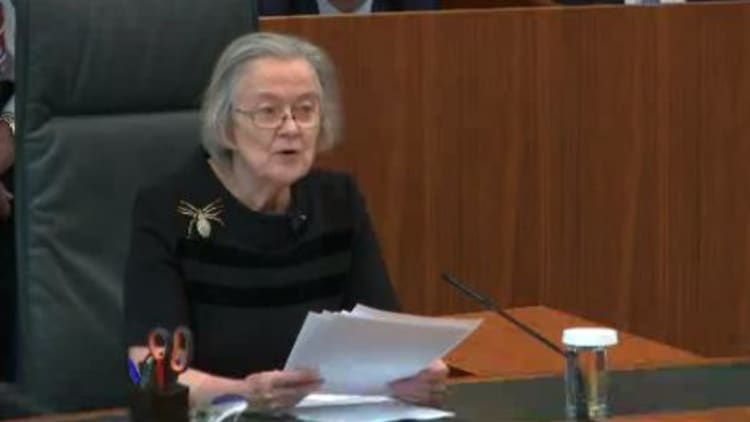
The highest court in the U.K. ruled Tuesday that Prime Minister Boris Johnson's decision to suspend Parliament for five weeks was unlawful.
Johnson, who has been pushing for Britain's withdrawal from the European Union, suspended Parliament on Sept. 10 through Oct. 14, leaving opponents little time to act before the Oct. 31 Brexit deadline.
Responding to the ruling, Johnson told the BBC the verdict was not right but would be respected. He also said that the government would "get on and deliver Brexit on October 31st come what may." There is currently no Brexit deal in place although lawmakers have already voted to prevent Johnson's government from taking the U.K. out of the bloc without a deal.
Sterling jumped nearly 0.40% after the decision to trade at $1.2478.
The president of the Supreme Court, Brenda Hale, said Johnson's attempt was not a normal suspension and that it had taken place in exceptional circumstances. She said no justification for the government taking such extreme action — to suspend Parliament for five weeks — had been put forward.
Hale said that the decision by Johnson's government to advise the queen to suspend parliament was unlawful "because it had the effect of frustrating or preventing the ability of Parliament to carry out its constitutional functions without reasonable justification."
Hale said the judges' decision was unanimous.
Although the judges ruled that the suspension is void, it was to lawmakers to decide what to do next. The court said Johnson's lawyer had told the court that the prime minister would comply with the judgment.
John Bercow, the speaker of the House of Commons, welcomed the decision and said Parliament must convene without delay, Reuters reported. Parliament is now expected to reconvene on Wednesday.
The leader of the opposition Labour Party, Jeremy Corbyn, said the decision showed that the prime minister had acted wrongly and that he had shown a "contempt for democracy and abuse of power." He said Johnson should consider his position. He also called for Parliament to be immediately recalled.
What happens next?
Paul Dales, the chief U.K. economist at Capital Economics, said there are three ways that the judgment could influence Brexit, the economy and the financial markets.
"First, if Parliament does indeed resume in the next few days, then MPs will have more time to try and tighten up the legislation that would force the Prime Minister to delay Brexit to 31st January," Dales said in a note Tuesday.
"Second, and more importantly, it presumably reduces the ability of the prime minister to suspend Parliament again, either before 31st October or ahead of any further Brexit deadline, thereby allowing Parliament more leeway to prevent a no deal. Third, Boris Johnson could resign as prime minister which, again, would reduce the chances of a no deal (although he said he wouldn't)."
The Supreme Court's 11 judges, or justices, were tasked with ruling on whether the government acted lawfully in suspending Parliament (a process known formally as prorogation) following a legal challenge brought by opposition lawmakers.
They said that the government's aim was to frustrate parliamentary debate on Brexit, and to stop opposition to Johnson's plans in the run-up to the departure date on Oct. 31.
The government denied this, saying the shutdown was normal procedure and that it would allow it to return in October and introduce new plans for the parliamentary year ahead.
Prorogation usually marks the end of one parliamentary session before the start of the next, and although it's normal for it to happen once a year, the timing of this prorogation created a storm of protests.
The U.K. still does not have a deal with the EU that has been approved by the U.K. Parliament.


